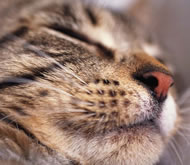Intellect thrives on sleep

Events of the day are rehearsed in sleep. <br>© Getty Images <br>
Land of nod is a learning experience
Cramming all night might help you to scrape through exams, but it won’t make you clever in the long run. Human and animal experiments are lending new support to a common parental adage: that a good night’s sleep is essential to learning.
“Modern life’s erosion of sleep time could be seriously short-changing our education potential,” warned Robert Stickgold of the Massachusetts Institute of Technology at the meeting of American Association for the Advancement of Science in Boston this week.
Many pianists find that sleeping on a tune can help their performance. Similarly, in the lab, volunteers’ skill at key-tapping and speed-spotting tasks improved by 20 per cent with one nights’ sleep after training. Extra nights of slumber enhanced skills even more.
If robbed of the first night’s kip, however, subjects went back to being novices – even two days later after catching up on their shut-eye. “How well you do at some things depends not on where you went to school or what your parents do, just on how well you slept last night,” said Stickgold.
He and his team have also found that different sleep phases influence different types of learning. Acing a visual test requires relaxed slow-wave sleep in the first quarter of the night, and rapid eye movement (REM) sleep in the last quarter. A movement test such as key tapping relies more on the non-REM episodes in the later part of the night.
“I think sleep is involved in rehearsing, restructuring and reclassifying our existing world view to allow us to function better,” Stickgold said.
Catnap dreams
As pet owners have long suspected, the same may apply to animals. Daniel Margoliash of University of Chicago has found evidence that young birds rehearse their new songs while sleeping. The brain cells that fire when birds make their first faltering efforts at singing show similar activity when they nap. “Birds dream of singing,” says Margoliash.
Rats, meanwhile, rehearse running in their sleep. After navigating a spiral maze all day, the rodents’ brains replay electrical signals that are characteristic of the motion throughout the night, Matthew Wilson of the Massachusetts Institute of Technology, told the meeting.
“Just like our own dreams, the replay can be recognisable but warped; some events are stretched out over time and others never really happened,” said Wilson. He believes that new experiences are generalized and re-evaluated during sleep.
Media Contact
More Information:
http://www.nature.com/nsu/020218/020218-20.htmlAll latest news from the category: Life Sciences and Chemistry
Articles and reports from the Life Sciences and chemistry area deal with applied and basic research into modern biology, chemistry and human medicine.
Valuable information can be found on a range of life sciences fields including bacteriology, biochemistry, bionics, bioinformatics, biophysics, biotechnology, genetics, geobotany, human biology, marine biology, microbiology, molecular biology, cellular biology, zoology, bioinorganic chemistry, microchemistry and environmental chemistry.
Newest articles

Innovative 3D printed scaffolds offer new hope for bone healing
Researchers at the Institute for Bioengineering of Catalonia have developed novel 3D printed PLA-CaP scaffolds that promote blood vessel formation, ensuring better healing and regeneration of bone tissue. Bone is…

The surprising role of gut infection in Alzheimer’s disease
ASU- and Banner Alzheimer’s Institute-led study implicates link between a common virus and the disease, which travels from the gut to the brain and may be a target for antiviral…

Molecular gardening: New enzymes discovered for protein modification pruning
How deubiquitinases USP53 and USP54 cleave long polyubiquitin chains and how the former is linked to liver disease in children. Deubiquitinases (DUBs) are enzymes used by cells to trim protein…



